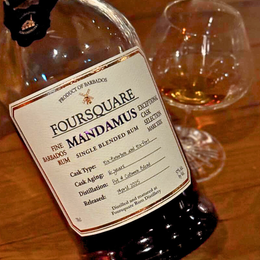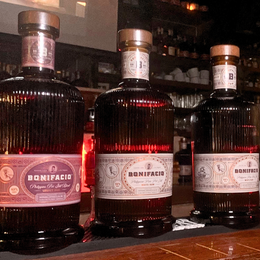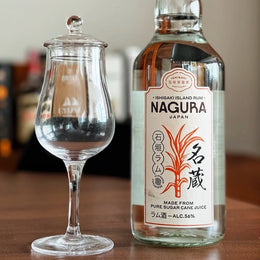
What even is a 20 Year Old Pure Single Haitian Rum?
For those familiar with the Caribbean country, which shares an island with the Dominican Republic, and lies really close to Jamaica and Cuba, you'll know that the country's main variety of local cane spirit, dubbed white lightning, is alittle bit of a sort of moonshine known as Clairin. There's little standardisation when it comes to Clairin (and thus it's not only been difficult to bottle them and present them internationally, but they've been seemingly impossible to classify, categorise or impose any sort of system unto), with probably the most consistent commonality being that it's produced in Haiti, and all of which are done so in sheds housing McGyver-ed distillation stills, typically part of a person's backyard and sitting right next to a field of sugarcane. It's raw, it's rustic, it's an important part of Haitian culture, history and heritage.


Cane spirits have been a staple of Haitian culture - one that is as pure and as raw as the country itself.
Yet, certainly none of them could even come remotely close to being aged for 20 years. There has been a new distillery on the island that's sprung up in recent times, courtesy of the same man who's helped to popularise Clairin as a cane spirit to the wider international rum community, yet that venture has only been around since 2017 - although a certain member of said venture comes from a family intimately involved with this mysterious 20 year old rum we're trying today.
And so whilst our intrepid Singaporean independent bottler Malt, Grain & Cane cannot explicitly disclose who is behind this 20 year old rum, there's really only one real suspect - the Barbancourt's. For us, at least one mystery is solved, and yet this remains a fun little riddle for anyone who chances upon this very stylish bottle.

The Société du Rhum Barbancourt.
So who are the Barbancourt's and why are they such an important part of Haiti's rum history?
For a start, Barbancourt has been at it for over 160 years, originating with a Dupre Barbancourt who had migrated from the heart of France's Cognac region Charente, to Haiti. Initially he was in the business of building cottages but had thought that it might be a better idea to make something with the vast sugarcane fields that Haiti possessed, especially as the country had little in the way of the aged spirits that he was used to back in Cognac. Dupre would quickly learn how to make rum, however, he would nevertheless infuse the process with his own Cognac sensibilities - using sugarcane juice, he would double distill it using Cognac-styled pot stills as is the practice with producing Cognacs, and afterwards he would age it in Limousin Oak from France, again a nod to his own origins.
What started with a French immigrant coming to Haiti and starting a rum distillery in 1862, has become a fifth generation family business, today led by Delphine Nathalie Gardere, whose middle name pays homage to Dupre Barbancourt's wife Nathalie Gardere. Herbert Linge today too manages the only other major rum distillery in Haiti, the one established in 2017, and whose grandmother Jane Barbancourt is the last living descendent to carry the Barbancourt name.

Today, as it has been for the better part of Rhum Barbancourt's history, the distillery has been the port of call when one thinks about Haitian rums on an international stage. Barbancourt had offered a beacon to the wider global rum community that Haiti too could systematically produce top quality rums that were distinctive, unique and of course, very tasty. They've won countless awards for their centuries long effort, but awards are not the best indicator of what's good (or not), it comes down to the fact that Barbancourt has proudly waved the Haitian flag all these years, through the numerous instabilities that the country has unfortunately seen, to safeguard the production of a rum that could be enjoyed around the world and would hold its own on the world stage. That Barbancourt has stayed on for 160-plus years is not just a marvel, but a testament to their commitment and courage!

This dragon has some secrets!
And that gets us to today's bottle - we've got the first Haitian rum to be independently bottled by Singaporean whisky and rum bottlers Malt, Grain & Cane (MGC). I actually think this might even be the first ever independently bottled Haitian rum by the little sunny island of Singapore - if so, good job to the folks at MGC for doing something so unique!
We've followed along MGC for some time now - it helps when you share the same country as them, all 734 km squares of it - and this Pure Single Haitian Rum, which simply means it's made by one distillery with no additives, comes from MGC's Year 4 collection. MGC tells me that its Year 4 collection will start off with an ongoing continuation of its homage to Japan, and therefore will feature several spirits, each celebrating a Japanese artist whose work will be worn on the label. Whilst the Year 3 collection's theme was KyoMurasaki, emphasising the royal purple colour along with a series of photographs across Japan by celebrated Singaporean artist Russel Wong (known for his portraits of the likes of Jackie Chan to Michelle Yeoh, and even Anthony Bourdain), Year 4 will follow the theme 'Bi' (Japanese) or 'Mei' ('美' in Chinese) to mean "beauty".

When asked "why the big Japan tribute", MGC tells me that they've a deep rooted appreciation for Japanese culture, and in particular its respect and reverence to its bars which are seen as great institutions, and whose bartenders and owners command great respect in not only serving as tastemakers but also as well-regarded resources in their deep knowledge of the spirits and cocktails they serve - every aspect of the experience is giving great attention to detail, and conducted with the utmost esteem. It was where the folks at MGC were first introduced to rums, and whose bars have served as a third home when away in Japan - hence you'll find many of MGC's bottlings a collaboration with both highly regarded Singaporean and Japanese bars alike.
And so today's bottle of Pure Single Haiti Rum kicks off the Year 4 collection - let's delve right in!

Japanese calligraphy artist Airi Hara.
The bottle carries the work of Japanese calligraphy artist Airi Hara 原 愛梨 whose focus has been to revitalise an interest in calligraphy by packaging her calligraphy works very elegantly in the form of various subject matter paintings or motifs - this work of hers Dragon (2024) demonstrates just that. We see an oriental style reddish-pink dragon, ferocious yet commanding of veneration, the sort we tend to find in Asian temples and feature in lores that tell of the power of these creatures, not as one to be feared, but rather as a presence whose might is to be respected, almost as a force and feature of nature. Yet, take a closer look at the body of the dragon and you'll find intricate calligraphy characters that have formed the pattern on the dragon's body - that's the calling card of artist Airi Hara. For this bottling, as we've seen in previous MGC bottlings, shine a UV light on the label and those calligraphy characters will shine through the darkness.

Bar Lamp Ginza celebrates its 20th Anniversary.
The rum itself, as mentioned, is produced by the esteemed Barbancourt distillery in Haiti, where it has been aged for 6 years tropically and 14 more years continentally in Europe, before being bottled at 58.6% ABV. This particular bottling also comes as a tribute by Malt, Grain & Cane in celebration of the 20th Anniversary of Bar Lamp Ginza. Fun Fact: A 10 Year Old Haitian Rum was also bottled for the 10th Anniversary of Bar Lamp Ginza by British wine & spirits merchant Berry Bros & Rudd.
Let's give it a go!
Rum Review: Pure Single Haiti Rum 2004, 20 Years Old, bottled by Malt, Grain & Cane, 58.6% ABV

Tasting Notes
Colour: Gold
Aroma: It opens up delicately aromatic, with a light muskiness of tropical fruits of longans and langsat, even some gooseberries and mangosteens, as well as some green bananas - all of which coated in an almost crystalline layer of sweet and rich maltose and honey. It’s giving tropical fruits in the form of tanghulu. With time, it’s more on orange blossoms, apricots and a mix of green and ripe mangoes. It’s alittle green, with also some tinned lychees and white dragonfruit. The fruits come together cohesively and the layers of which are subtle yet distinct enough to pick out with time. It’s rather multi-dimensional in its fruitiness - musky, estery, sweet, tart, zesty, green, exotic. With time it settles on honey, dried mangoes, orange blossoms and some gentle notes of sarsaparilla.
Taste: Medium-bodied, great richness here, it’s got a really good intensity and focus in delivering a fruit basket that is at once distinct yet incredibly cohesive and well-integrated. Again there’s that elegant and crystalline coating of honey and maltose, within which are longans, green bananas, langsat, mangosteens and lychees. It’s again slightly green, definitely tropical, and with a slight muskiness - a whole bunch of green and white tropical fruits. There’s a nice peppery hit to it as well that perks it up, as well as a gentle acidity that keeps it fresh. It’s expansive in its fruitiness, with layers that fan out from a concentrated and well-defined core.
Finish: The intensity and power carries through to the finish with that pepperiness, along with the maltose, honey and tropical fruits. It’s an incredibly long finish, with the richness persistent, with more of the greenness of green bananas and unripe tropical fruits delivering more of that acidity with a slight pucker - that textural tension that builds at the finish is really enjoyable. A slight bit of diesel and green olives, giving some salinity to it as well, before it’s back to the honey and green tropical fruits.

My Thoughts
A very well-executed Haitian rum! This is definitely well presented, an excellent piece of work, very very impressive! For a start, it’s incredibly tasty, and simply put it’s rich, it’s intense, it’s this concentrated focus on honey and green and white tropical fruits that persists from the nose to the palate and finish.
Breaking it down further, what impresses me is how the layering of these fruits is rendered so tastefully and elegantly - at first it comes off as a hit of these concentrated fruit cordials, yet quickly you’ll notice various aspects of it that calls out to you and guides you to peeling back that layer, beneath one layer are the green fruits of bananas and other unripe tropical fruits that gives greenness and some sourness; peel back another layer and you find musky white fruits of longans, langsat and more fleshy mangosteens, whilst a different layer gives more acidity of white dragonfruits. And that goes on, and on. It’s incredibly complex yet subtle in its complexity - incredibly exotic and again superbly structured and concentrated.
It also features this wonderful intensity and power that demonstrates that it can keep that concentration of fruit all the way through, not ever letting up, even on the finish. Impressively it never thins out! It’s got a peppery hit that perks you up, along with that zingy freshness of acidity of the green fruits that’s almost reminiscent of a White Burgundy. Into the finish, there’s this nice textural tension where that acidity builds and gives a nice pucker and dryness that keeps you going back for more in search of that freshness and crystalline bedrock of honey and maltose.
Very, very delicious. It’s impressive and has a presence in and of itself. It’s one that’s worth taking the time to sit back, unpack and appreciate.
Kanpai!

@111hotpot







